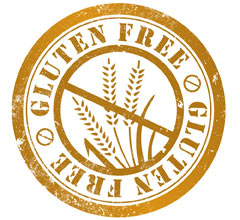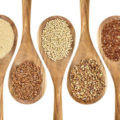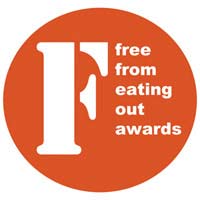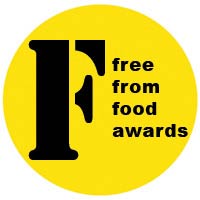 We’ve discussed what you can eat: what can’t you eat?
We’ve discussed what you can eat: what can’t you eat?
Short answer: wheat, oats, barley and rye.
Medium answer: wheat, barley and rye – recent studies indicate that some coeliacs can tolerate contamination-free oats in small portions. Best to check with your consultant or dietician, and perhaps get fully back to normal before trying oats. We’re not giving oats to our daughter yet – though she’s been diagnosed for 10 years.
Long answer: look out for the following ingredients …
- barley
- pot barley
- scotch barley
- bran
- breadcrumbs
- bulgar
- cereal extract
- couscous
- cracked wheat
- durum wheat
- farina
- flour
- gluten
- kamut
- malt
- modified starch
- oat bran
- oats
- oatmeal
- porridge oats
- rolled oats
- rusk
- rye flour
- semolina
- spelt
- triticale
- vegetable protein
- vegetable gum
- vegetable starch
- wheat bran
- wheat germ
- wheat flour
- wholemeal flour
- whole-wheat
- wheat
Most of these items are rarely seen on ingredients labels. You will quickly get used to what is and what isn’t going to be OK to eat. Sausages, for instance, almost always contain rusk. Burgers sometimes do. And labelling is getting better.
And then there is malt. Malt extract is widely used as a flavouring – especially in breakfast cereals – and is only present in tiny amounts. It comes from barley, and you should definitely avoid pure malt extract, or malted drinks. But you may be OK to eat malt extract in the tiny amounts in – for example – breakfast cereals. If you are unsure, avoid it.
Some people must also avoid wheat – not just the gluten within the wheat. Wheat free is not the same as gluten free! Rye bread, for instance, might be wheat free because there is no wheat in it, but not gluten free, because there is gluten in rye.
Some gluten free breads and other products contain wheat with the gluten removed to CODEX Alimentarius standards (i.e. very low amounts remaining – less than 200 parts per million). If you must be wheat free, you should avoid these CODEX products because they still contain wheat. It is possible, if your symptoms are not disappearing, that you are a sensitive coeliac and should also avoid these CODEX products.
The list of things you can eat is much longer than the list of things to avoid. Unfortunately, the bad things are widespread, and you must check everything until you are used to the diet. And then check some more, because things change:
New! Improved! New Recipe! Now 90% fat-free!
isn’t always a good thing.
 |
I’ve written a book summarising what we’ve learnt over 20 years of dealing with the gluten free diet, and it might be just what you’re looking for. It packs the lessons we’ve learned into what I hope is a helpful and straightforward guidebook. It’s available on Amazon, as a paperback or for your Kindle… |





I just started the diet of being gluten free about a month ago. I have done some research about it but I can not find material about which additives are gluten free and which are not. For example: Dextrose, is it gluten free? Is there something or somewhere in my search that I am missing this?
Hi Jody – tricky question! And needs a full post to discuss fully (note to self).
Celiac Sprue Association’s library and Celiac.com’s Forbidden List imply that dextrose may be derived from a gluten-containing grain, and that you should check with the manufacturer. (These are useful links to explore as a newly gluten-free person anyway).
The guidance in the UK (and EU generally) is that dextrose (and maltodextrin) may be derived from a gluten-containing grain but that the manufacturing process eliminates all but tiny amounts of gluten – less than the permitted minimum. Coeliac UK says that maltodextrin contains undetectable levels of gluten – and that it does not contain malt.
This difference is I think because the levels of permitted gluten are lower in the US (20ppm) than in the UK (200ppm). Also, clearer labelling as to whether the dextrose (for example) is derived from corn starch or wheat starch would be helpful.
This doesn’t give you clearcut guidance – but perhaps you can make a decision about what to eat based on the information in the links. And if you’re not sure – don’t eat it!
Looking for my grandaughter. Will have to wait for results. In the mean time, we so appericate YOU being here for advice.
Thanks Alene. I hope you get the results you want for your granddaughter, and that it isn’t too long to wait – I found it was better once we had a diagnosis so we knew what to do.
This is directed to Lucys comment about gluten being eliminated during the manufacturing process.. any amount of gluten, even the smallest can trigger an illness, there is no safe level for someone suffering from celiac disease
Jason – you’re right to pick me up on this. I take it you’re someone who reacts to levels of gluten below the permitted levels? I should have made it clearer that there are people who do. As I said: if you’re not sure, don’t eat it!
?? ?????????? ?????? ???????? ????????????????? ????? ?? ??????? ????? ? ?????, ?????????????? ? ??????????? ? ?????? ???????.
some people are ill with only small amounts but then again with some a small amount can be tolerated. Is it not true that when you give up gluten totally, you become more suceptable and allergic to it.
Hi. I have to be GF except for oats. I so miss the Muesli and dried fruit. I lived on it. Are you going to put it back on the shelves in the near future?
antoinette tierney
I sent my e-mail but will send it again in case I messed up
I buy 6 pkts of the Muesli so I have some when I am hungry.
I buy 6 pkts of the Muesli so I have some when I am hungry . I have to be GF but found that oats were ok. So missing breakfast. \please put it back on our shelves.